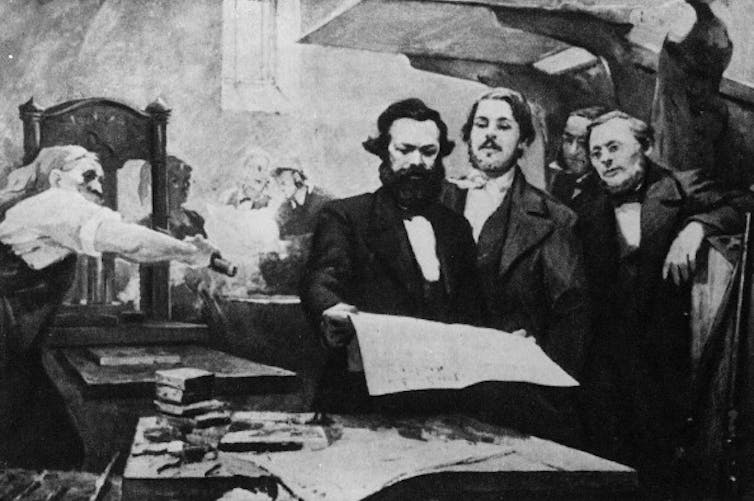Sanders called JPMorgan's CEO America's 'biggest corporate socialist' – here's why he has a point
- Written by Paul Adler, Professor of Management and Organization, Sociology and Environmental Studies, University of Southern California
Sen. Bernie Sanders called JPMorgan Chase CEO Jamie Dimon the “biggest corporate socialist in America today[1]” in a recent ad.
He may have a point – beyond what he intended.
With his Dimon ad, Sanders is referring specifically to the bailouts JPMorgan[2] and other banks took from the government during the 2008 financial crisis. But accepting government bailouts and corporate welfare is not the only way I believe American companies behave like closet socialists despite their professed love of free markets.
In reality, most big U.S. companies operate[3] internally in ways Karl Marx would applaud as remarkably close to socialist-style central planning. Not only that, corporate America has arguably become a laboratory of innovation in socialist governance, as I show in my own research[4].
 Karl Marx might feel right at home in a typical U.S. corporation.
Roger Viollet via Getty Images
Karl Marx might feel right at home in a typical U.S. corporation.
Roger Viollet via Getty Images
Closet socialists
In public, CEOs like Dimon[5] attack socialist planning while defending free markets.
But inside JPMorgan and most other big corporations, market competition is subordinated to planning. These big companies often contain dozens of business units and sometimes thousands. Instead of letting these units compete among themselves, CEOs typically direct a strategic planning process[6] to ensure they cooperate to achieve the best outcomes for the corporation as a whole[7].
This is just how a socialist economy is intended to operate. The government would conduct economy-wide planning and set goals for each industry and enterprise, aiming to achieve the best outcome for society as a whole.
And just as companies rely internally on planned cooperation to meet goals and overcome challenges, the U.S. economy could use this harmony to overcome the existential crisis of our age – climate change. It’s a challenge so massive and urgent that it will require every part of the economy[8] to work together with government in order to address it.
Overcoming socialism’s past problems
But, of course, socialism doesn’t have a good track record.
One of the reasons socialist planning failed in the old Soviet Union, for example, was that it was so top-down[9] that it lacked the kind of popular legitimacy that democracy grants a government. As a result, bureaucrats overseeing the planning process could not get reliable information about the real opportunities and challenges experienced by enterprises or citizens.
Moreover, enterprises had little incentive to strive to meet their assigned objectives, especially when they had so little involvement in formulating them.
A second reason the USSR didn’t survive was that its authoritarian system failed to motivate[10] either workers or entrepreneurs. As a result, even though the government funded basic science generously, Soviet industry was a laggard in innovation[11].
Ironically, corporations – those singular products of capitalism – are showing how these and other problems of socialist planning can be surmounted.
Take the problem of democratic legitimacy. Some companies, such as General Electric[12], Kaiser Permanente[13] and General Motors[14], have developed innovative ways to avoid the dysfunctions of autocratic planning by using techniques[15] that enable lower-level personnel to participate actively in the strategy process.
Although profit pressures often force top managers to short-circuit the promised participation, when successfully integrated it not only provides top management with more reliable bottom-up input[16] for strategic planning but also makes all employees more reliable partners[17] in carrying it out.
So here we have centralization – not in the more familiar, autocratic model, but rather in a form I call “participative centralization.” In a socialist system, this approach could be adopted, adapted and scaled up to support economy-wide planning, ensuring that it was both democratic and effective.
 The USSR was good at collectivism but bad at innovation.
Central Press/Getty Images)
The USSR was good at collectivism but bad at innovation.
Central Press/Getty Images)
As for motivating innovation, America’s big businesses face a challenge similar to that of socialism. They need employees to be collectivist, so they willingly comply with policies and procedures. But they need them to be simultaneously individualistic, to fuel divergent thinking and creativity.
One common solution in much of corporate America, as in the old Soviet Union, is to specialize those roles[18], with most people relegated to routine tasks while the privileged few work on innovation tasks. That approach, however, overlooks the creative capacities of the vast majority and leads to[19] widespread employee disengagement and sub-par business performance.
Smarter businesses have found ways to overcome this dilemma by creating cultures and reward systems that support a synthesis of individualism and collectivism that I call “interdependent individualism.” In my research, I have found this kind of motivation in settings as diverse as Kaiser Permanent physicians[20], assembly-line workers at Toyota’s NUMMI plant[21] and software developers at Computer Sciences Corp[22]. These companies do this, in part, by rewarding both individual contributions to the organization’s goals as well as collaboration in achieving them.
While socialists have often recoiled[23] against the idea individual performance-based rewards, these more sophisticated policies could be scaled up to the entire economy to help meet socialism’s innovation and motivation challenge.
Big problems require big government
The idea of such a socialist transformation in the U.S. may seem remote today.
But this can change, particularly as more Americans, especially young ones, embrace socialism[24]. One reason they are doing so is because the current capitalist system has so manifestly failed to deal with climate change.
Looking inside these companies suggests a better way forward – and hope for society’s ability to avert catastrophe.
[ Get the best of The Conversation, every weekend. Sign up for our weekly newsletter[25]. ]
References
- ^ biggest corporate socialist in America today (www.bloomberg.com)
- ^ bailouts JPMorgan (dealbook.nytimes.com)
- ^ most big U.S. companies operate (anon-ftp.iza.org)
- ^ my own research (global.oup.com)
- ^ Dimon (www.cnbc.com)
- ^ strategic planning process (hbr.org)
- ^ as a whole (store.hbr.org)
- ^ every part of the economy (www.weforum.org)
- ^ top-down (www.cambridge.org)
- ^ failed to motivate (www.jstor.org)
- ^ laggard in innovation (www.amazon.com)
- ^ General Electric (www.semanticscholar.org)
- ^ Kaiser Permanente (www.sciencedirect.com)
- ^ General Motors (www.jstor.org)
- ^ techniques (hbr.org)
- ^ reliable bottom-up input (doi.org)
- ^ reliable partners (www.jstor.org)
- ^ specialize those roles (hbr.org)
- ^ leads to (www.gallup.com)
- ^ Kaiser Permanent physicians (doi.org)
- ^ assembly-line workers at Toyota’s NUMMI plant (hbr.org)
- ^ software developers at Computer Sciences Corp (aisel.aisnet.org)
- ^ socialists have often recoiled (thesocialist.org.au)
- ^ embrace socialism (www.axios.com)
- ^ Sign up for our weekly newsletter (theconversation.com)
Authors: Paul Adler, Professor of Management and Organization, Sociology and Environmental Studies, University of Southern California

